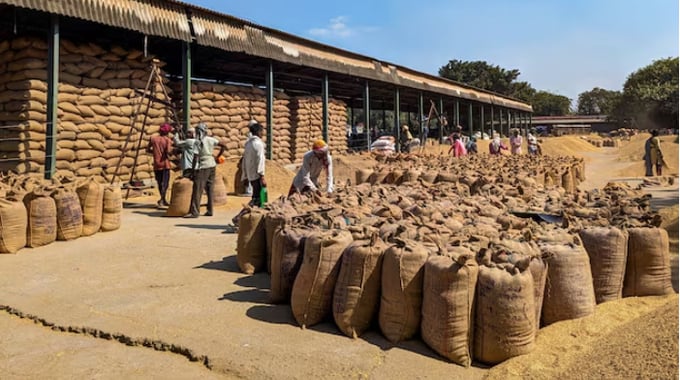November 26, 2025 | 01:53 GMT +7
November 26, 2025 | 01:53 GMT +7
Hotline: 0913.378.918
November 26, 2025 | 01:53 GMT +7
Hotline: 0913.378.918

Workers weigh and pack paddy bags at Sitapur market, in the northern state of Uttar Pradesh, India October 20, 2023.
Buoyed by forecasts of higher rice output, farmers and rice exporters recently urged the government to remove the floor price for non-basmati white rice exports that was imposed partly to ensure security of supply.
Last month, India gave the go ahead for exports of non-basmati white rice to resume. But New Delhi set a floor price for non-basmati white rice exports at $490 a metric ton.
Higher rice shipments from India, the world's biggest rice exporter, would bolster global supplies and soften international prices by forcing other major exporters - such as Pakistan, Thailand and Vietnam - to reduce their rates, trade and industry officials said.
Because of the floor price, Indian farmers and exporters were prohibited from selling some relatively cheaper grades on the world market, said Dev Garg, vice-president of the Indian Rice Exporters Federation.
"With today's decision, there is no such restriction now," Garg said.
Indian supplies will be more competitive as India can offer its 5% broken white rice at around $460 per metric ton, said B.V. Krishna Rao, president of the Rice Exporters' Association.
India will be able to sell 25% broken white rice, which is usually offered at a sharp discount to 5% broken rice and sought by some African countries, traders said.
On Tuesday, India scrapped the export tax on parboiled rice, as inventories surged and the country is set to produce a bumper crop after copious monsoon rains.
When the El Nino weather pattern in 2023 raised the prospect of poor monsoon rains, India imposed various curbs on rice exports and extended them into 2024 to keep local prices in check ahead of the April-June national election.
Since the 2023 export restrictions, local supplies have picked up, bumping up stocks at government warehouses.
(Reuters)

(VAN) An Giang promotes supply-demand connections, standardizes quality and builds value chains, creating a foundation for sustainable bird’s nest development and aiming to expand exports.
/2025/11/24/5339-4-nongnghiep-075331.jpg)
(VAN) Recently, the conference on 'Sustainable Fisheries Linkage Chain - Tilapia for Export' took place in Tien Hai commune, Hung Yen province.
/2025/11/21/4309-2-153400_128.jpg)
(VAN) Green and low-emission rice is paving the way for Vietnamese rice to enter high-end markets, marking the beginning of a transformation journey toward greening and elevating the national rice brand.

(VAN) ‘Right to Win’ outlines a national action plan that shapes a new vision for Viet Nam’s agriculture in an era of renewal and global integration.

(VAN) Lam Dong’s farmed sturgeon output this year is expected to reach 2,300 tons, worth VND 450 billion, affirming the brand’s position on the market.

(VAN) A surge in Ukrainian egg exports, largely driven by soaring sales to the UK over the last few years, has notably pushed up egg prices on the domestic market.

(VAN) The price of Arabica Catimor coffee in Quang Tri is currently at VND 25,000–27,000/kg (fresh cherries), the highest level ever recorded